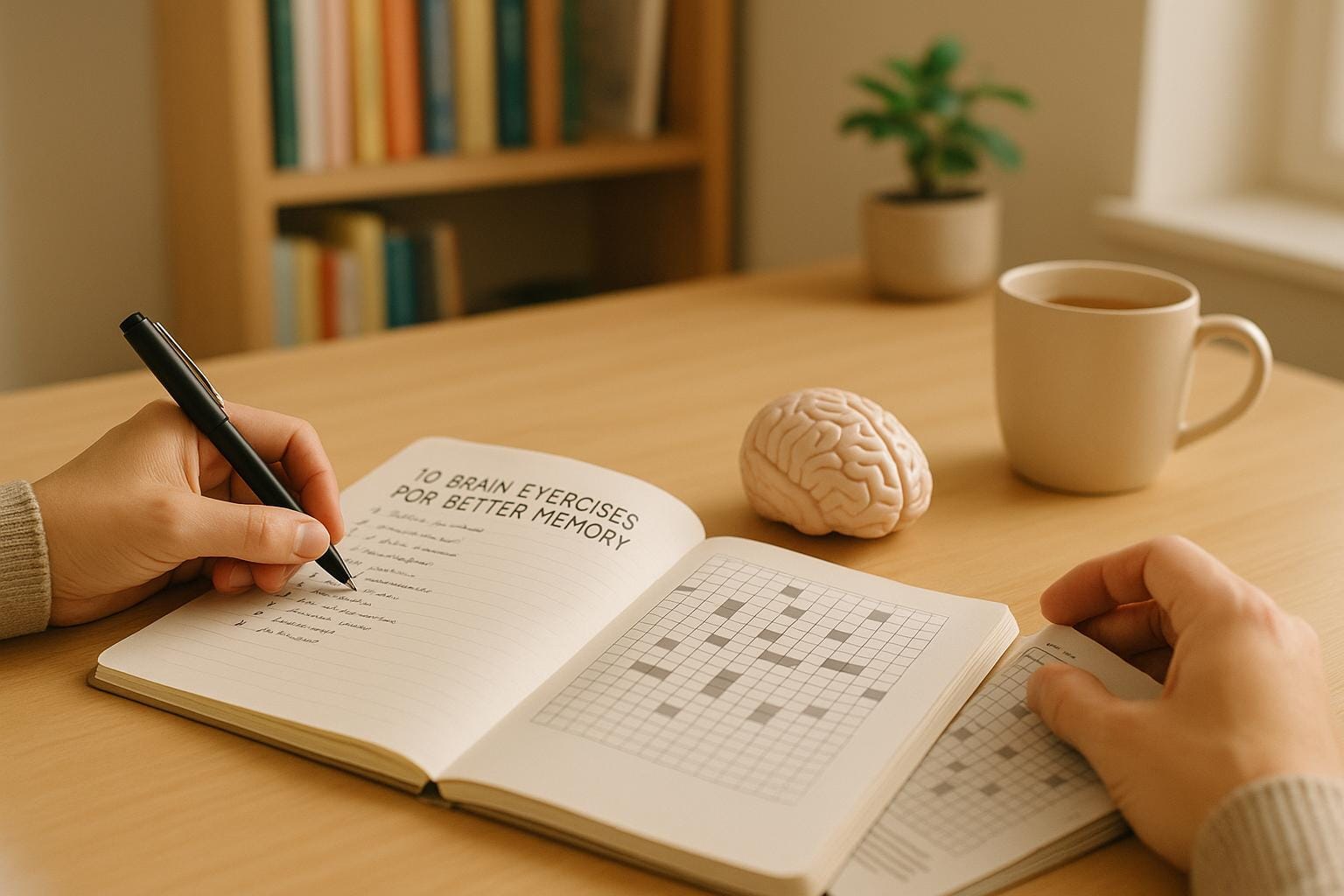Ever feel extra irritable or stressed after a bad night’s sleep? That’s because sleep plays a huge role in how well you manage emotions. Without enough rest, your brain struggles to handle stress, control impulses, and process emotions effectively. Here’s what you need to know:
- Sleep deprivation impacts your brain: It reduces activity in areas that help with decision-making and impulse control, leading to heightened emotional reactions and poor stress management.
- REM sleep is key: This sleep stage helps process emotions, strengthen positive memories, and reduce negative ones - like hitting an emotional reset button.
- Stress and sleep are connected: Poor sleep increases stress, and high stress disrupts sleep, creating a tough cycle.
Quick Tips to Sleep Better and Manage Emotions:
- Stick to a consistent sleep schedule.
- Create a calming bedtime routine (e.g., reading, meditating).
- Optimize your bedroom - keep it cool, dark, and quiet.
- Use stress-relief techniques like deep breathing or yoga.
Better sleep leads to better emotional balance. Start small - try one tip tonight!
Dr. Matt Walker: Improve Sleep to Boost Mood & Emotional ...
Sleep's Effects on Emotions: The Research
Research confirms that the quality of your sleep has a direct impact on how your brain processes emotions and handles stress. Sleep isn’t just about rest - it’s a key player in mental health.
What Happens When You Don't Sleep Enough
Not getting enough sleep can throw your brain off balance, especially when it comes to managing emotions. The prefrontal cortex, which helps with decision-making and impulse control, becomes less active when you’re sleep-deprived. This can lead to:
- Heightened emotional reactions
- Poor judgment in social interactions
- Difficulty managing stress
- A greater tendency to take risks
If lack of sleep becomes a long-term issue, it can amplify feelings of irritability, anxiety, and sadness, making emotional regulation even harder.
Why REM Sleep Matters for Processing Emotions
REM sleep plays a critical role in managing emotions. During this stage, your brain processes emotional experiences, strengthens positive memories, and reduces the intensity of negative ones. It’s like an emotional reset button for the next day.
"Sleep is crucial for emotional well-being and resilience." - fitup
The connection between poor sleep and emotional instability becomes especially clear when looking at stress. Studies show that inadequate sleep is strongly linked to higher stress levels.
Here’s a closer look at how sleep deprivation affects key brain functions:
| Brain Function | Impact of Sleep Deprivation |
|---|---|
| Decision Making | Increased tendency to make risky choices |
| Emotional Response | Greater sensitivity to negative stimuli |
| Stress Management | Struggles to handle daily stress effectively |
| Impulse Control | Reduced ability to manage emotional impulses |
These findings highlight the importance of good sleep for emotional stability. Understanding these effects is the first step toward improving both sleep habits and emotional health.
This article is for informational purposes only and is not intended as medical advice. Please consult a healthcare professional before starting any new fitness or wellness routine.
5 Ways to Sleep Better and Control Emotions
Understanding how sleep affects your well-being is only the first step. Now, let’s look at some practical strategies to improve your sleep and, in turn, help you manage your emotions more effectively.
Keep a Consistent Sleep Schedule
Going to bed and waking up at the same time every day - even on weekends - helps regulate your internal clock. This consistency can support better emotional balance.
Here’s how to stick to a schedule:
- Choose a bedtime that matches when you naturally start feeling sleepy.
- Set an alarm for the same wake-up time daily, no matter the day of the week.
Create a Pre-Sleep Routine
A relaxing routine before bed signals your body that it’s time to wind down, making it easier to fall asleep. Try incorporating these calming activities:
- Turn off screens to limit blue light exposure.
- Take a warm shower or bath to relax your muscles.
- Spend time reading, meditating, or practicing deep breathing.
- Do light stretches to release any tension in your body.
Optimize Your Bedroom for Sleep
Your sleep environment plays a big role in how well you rest. Make a few adjustments to create the perfect setting:
- Keep it cool: A slightly cooler room temperature can help you sleep more deeply.
- Block out light: Use blackout curtains or a sleep mask to maintain darkness and support melatonin production.
- Minimize noise: Try a white noise machine or earplugs to block out disruptive sounds.
These simple changes can make a big difference in how you sleep and how well you handle stress.
This article is for informational purposes only and is not intended as medical advice. Please consult a healthcare professional before starting any new fitness or wellness routine.
How Sleep and Stress Affect Each Other
Sleep and stress are closely connected: higher stress levels lead to increased cortisol production through the HPA axis, which can disrupt your sleep. On the flip side, poor sleep often heightens stress responses, creating a challenging cycle.
This cycle can result in trouble falling asleep, waking up frequently during the night, lower sleep quality, and shorter sleep duration. Breaking this pattern requires strategies aimed at reducing stress and improving sleep.
How to Keep Stress from Disrupting Your Sleep
Understanding the connection between stress and sleep is the first step. Here’s how to address it:
Incorporate Gentle Movement
Activities like yoga can help ease stress and improve how well you sleep.
"Mindful Yoga Tips for Enhanced Flexibility and Reduced Stress" - fitup
Explore Stress-Relief Techniques
Mindfulness meditation has been shown to reduce stress by 20% over three months while improving sleep quality [2].
Set Clear Boundaries for Relaxation
Creating a divide between work and rest can help your mind and body prepare for sleep. Here are some tips:
- Avoid work-related emails at least two hours before bed.
- Set a specific time earlier in the day to reflect on any concerns.
- Try progressive muscle relaxation before going to bed.
- Use deep breathing exercises to manage stress.
This article is for informational purposes only and is not intended as medical advice. Please consult a healthcare professional before starting any new fitness or wellness routine.
Conclusion
Understanding how sleep influences our emotions is key to better managing our mental health. Quality sleep plays a major role in how we handle stress and regulate emotions.
Try these tips to improve your sleep for better emotional balance:
- Stick to a regular sleep schedule: Go to bed and wake up at the same time every day.
- Establish a calming bedtime routine: Wind down with relaxing activities like reading or meditation.
- Create a sleep-friendly environment: Keep your bedroom dark, quiet, and cool.
- Manage stress effectively: Incorporate techniques like deep breathing or journaling to ease your mind.
REM sleep helps reset emotional responses and reduce stress levels. By focusing on improving your sleep habits, you can support your mental health and emotional well-being. Remember, it's not about sleeping more hours but creating the right conditions for your mind and body to recover.
Start small - pick one habit to work on today. Even minor changes can make a noticeable difference in how you sleep and feel.
This article is for informational purposes only and does not replace professional medical advice. Always consult a healthcare provider before starting new health or wellness practices.
FAQs
How can I know if my emotional struggles are related to poor sleep?
Poor sleep can significantly affect emotional regulation, making it harder to manage stress, control mood swings, or handle daily challenges. Signs that your emotional difficulties might be linked to sleep issues include feeling irritable, overwhelmed, or unusually sensitive after a bad night's sleep. You may also notice increased anxiety, sadness, or difficulty concentrating when you're not well-rested.
To improve your emotional balance, prioritize good sleep habits. Aim for 7–9 hours of quality sleep per night, stick to a consistent bedtime, and create a calming evening routine to wind down. If emotional challenges persist despite improving your sleep, consider consulting a healthcare professional for further guidance.
What are the signs that my REM sleep might be disrupted?
Disrupted REM sleep can affect both your emotional well-being and overall health. Common signs include:
- Increased emotional sensitivity: You may feel more irritable, anxious, or overwhelmed by minor stressors.
- Difficulty concentrating: Poor REM sleep can impair your ability to focus or make decisions.
- Frequent vivid dreams or nightmares: These may indicate your REM cycles are fragmented or incomplete.
If you notice these signs, consider improving your sleep habits by maintaining a consistent bedtime, limiting screen time before bed, and creating a relaxing sleep environment. Better REM sleep can lead to improved emotional regulation and mental clarity.
Can better sleep habits help reduce anxiety or depression over time?
Yes, improving your sleep habits can play a significant role in managing anxiety and depression. Sleep is essential for emotional regulation, as it helps your brain process emotions and stress more effectively. Poor sleep can amplify negative emotions and make it harder to cope with daily challenges, which may worsen anxiety or depressive symptoms over time.
To support better mental health, focus on creating a consistent sleep schedule, limiting screen time before bed, and ensuring your sleep environment is comfortable and free of distractions. While sleep alone isn’t a cure, it can be a powerful tool in combination with other wellness practices to improve your emotional well-being.












